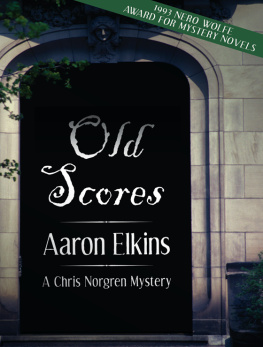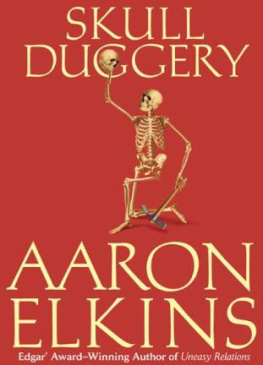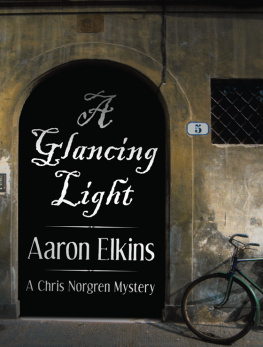Aaron Elkins - Fellowship Of Fear
Here you can read online Aaron Elkins - Fellowship Of Fear full text of the book (entire story) in english for free. Download pdf and epub, get meaning, cover and reviews about this ebook. genre: Detective and thriller. Description of the work, (preface) as well as reviews are available. Best literature library LitArk.com created for fans of good reading and offers a wide selection of genres:
Romance novel
Science fiction
Adventure
Detective
Science
History
Home and family
Prose
Art
Politics
Computer
Non-fiction
Religion
Business
Children
Humor
Choose a favorite category and find really read worthwhile books. Enjoy immersion in the world of imagination, feel the emotions of the characters or learn something new for yourself, make an fascinating discovery.

- Book:Fellowship Of Fear
- Author:
- Genre:
- Rating:5 / 5
- Favourites:Add to favourites
- Your mark:
- 100
- 1
- 2
- 3
- 4
- 5
Fellowship Of Fear: summary, description and annotation
We offer to read an annotation, description, summary or preface (depends on what the author of the book "Fellowship Of Fear" wrote himself). If you haven't found the necessary information about the book — write in the comments, we will try to find it.
Fellowship Of Fear — read online for free the complete book (whole text) full work
Below is the text of the book, divided by pages. System saving the place of the last page read, allows you to conveniently read the book "Fellowship Of Fear" online for free, without having to search again every time where you left off. Put a bookmark, and you can go to the page where you finished reading at any time.
Font size:
Interval:
Bookmark:
Fellowship Of Fear
Aaron Elkins
ONE
They were obviously professionals. They worked with a cold precision, item by item, methodical and disinterested. First the obvious places, the places an amateur would have put it: shelves, suitcases, bureau drawers. Everything was put back exactly into its place, every shirt refolded along the original crease marks, the dirty laundry piled carefully into its original disarray.
The taller man spoke. "Nothing. You?"
The other was compact, sleek-headed, with a V-shaped, rodentlike face. "No."
They walked to the door of the room without speaking further and fanned out slowly along the walls, the tall one going to the left, the other to the right. Now they moved to the less obvious places. They uncovered the plates to the two electrical outlets; they fingered the linings of ties, removed light bulbs and looked in the sockets, sought hollow places in the heels of shoes, belt buckles, razor handles, book bindings. They went over the bedding and the bed frame, then carefully remade the bed and put the head-shaped depression back in the pillow. They bent a wire hanger, went into the bathroom, and explored the drain of the sink and the toilet trap. They unscrewed the barrels of ballpoint pens and twisted the erasers on pencils to see if they would come off.
It took an hour. Finally the taller man said, "No. If hes got it, hes got it on him. Too bad for him."
"What time?" said the smaller one.
"Nine-fifteen. Hes not going to be back for a while yet. Should we turn the lights off?"
"Turn them off."
They sat in the dark for a while. The tall one said, "Hes a pretty big guy, you know. Six-one, six-two. Strong-used to box in college."
"So?"
"So hes going to be full of booze. Hes liable to get smart."
The sleek-headed man grinned. His neck was long and muscular. The light from a street lamp, coming in through the window, glinted on his teeth.
Gideon Oliver was having a fine time, no doubt about it. With the rest of the new teaching faculty, he had arrived that morning at the sprawling, smoggy Rhein-Main United States Air Base outside of Frankfurt. The long night flight from McGuire Air Force Base in New Jersey, which had made the others grumpy with fatigue, had left him in a state of fuzzy euphoria over setting foot in Europe for the first time.
Dr. Rufus, the colleges ebullient chancellor, had been there to welcome the twelve of them with booming voice and hearty handshakes, and had quickly and efficiently bundled them aboard a creaky army bus for the trip to Heidelberg. While the others slept or looked glumly out the window, Gideon watched with pleasure as the air turned clear, the flat land gave way to forested hills, and picture-book villages began to appear.
They had reached Heidelberg a little before 2:00 p.m., and were booked into the Hotel Ballman, on the busy Rohrstrasse. There they were greeted by the cranky proprietress, Frau Gross, who seemed entirely displeased to see them, and by a bored college official who told them about the dinner that evening, gave them directions on how to get to it, and advised them all to get some sleep before then. Gideon was too excited for that, and spend the afternoon strolling along the Philosophers Walk, Michelin in hand, enjoying the clear air and looking down on the Old Town, the busy river, and the eleventh-century bridge. Often he stopped to sit on a bench and drink in the stupendous ruined castle that dominated every part of the town from its hill above the Neckar, its honey-colored stones rich and benign, yet faintly sinister.
In the evening, the entire faculty, new and old, along with the administrative staff, met for dinner in the Schloss Weinstube, modern dining room in one of the castles ancient chambers. Although not basically gregarious, Gideon Oliver was an essentially civil person, so that when he found himself in an unavoidable social situation he made the best of it. And when the food and wine were good, the conversation intelligent, and the women reasonably attractive, he had been known to actually enjoy himself. These conditions having been met tonight in varying degrees, he was enjoying himself very much.
During dinner he shared a table with three of the senior staff. Janet Feller alone accounted for most of the evenings intelligent conversation and female attractiveness. She had taught history for three years and was taking the semester off to work at the great library of nearby Heidelberg University, putting the finishing touches on her dissertation. Tall and long-limbed, with a languid grace and a definitely provocative eye, she chatted easily about a variety of esoteric subjects, from the evolution of Paleocene mammals, to polyphonal baroque music, to the chemistry of altered states of consciousness. Gideon, as usual, was fairly quiet, and Janets attention had been greedily seized by the other two men at the table-not so much, however, that he failed to perceive the asides she made for his benefit, or to note an occasional dark-eyed glance in his direction.
Gideon Oliver was not a conventionally handsome man, and he knew it. He also knew that his big frame, broken nose, and soft brown eyes gave him a gentle ruggedness that many women found attractive.
He was by no means on the prowl. His wife of nine years, whom he had loved with all his soul, had died in an automobile accident two years earlier, and just as he had found no one to compare with her when she was alive, he had found no one since, and he wasnt looking hard. Still, even if not overly susceptible to women, he was by no means immune, and felt, through the wine-induced lassitude, a familiar stirring whenever Janet rearranged her long legs and looked briefly at him with unmistakably friendly intent.
The other two at the table had contributed less to the evenings pleasures. Bruce Danzig, the faculty librarian, was a fussy little man with fussy little hands and feet and a neat little lump of a pot belly-like a cantaloupe-across the exact center of which his belt lay. He delivered his words with irritating precision, pursing and stretching his lips lest a single phoneme emerge incompletely rounded.
On Gideons other side, between him and Janet, sat Eric Bozzini, assistant professor of psychology. Three times during the meal he described himself as a laid-back Californian, and groomed himself for the part: long hair, neatly trimmed into a sort of page-boy cut below the ears, a Pancho Villa mustache, tinted glasses that never seemed to come off, and an open-throated shirt revealing some sort of canine attached to a thin, gold chain and nestling on a tanned, hairy chest. But at something near Gideons own age of thirty-eight, the image was wearing a little thin; a widows peak was discernible under the brushed-forward hairline, the face was a little fleshy, the chest a trifle puffy and soft-looking. Even the bronze skin seemed sunlamp-induced.
Gideon thoroughly enjoyed the dinner. While Bozzini directed his laid-back charms at Janet with grim determination, and Danzig competed with prissy little attempts at humor, Gideon concentrated on the food, enjoying the ripe German menu terms- Zwiebelsuppe, Forelle, Gemandeltes Truthahnschnitzel -almost as much as the food itself: clear onion soup, lightly grilled fresh trout, and sauteed turkey breast dusted with almonds. And of course the German wine: live, piquant, and intoxicating. Afterwards came coffee and enormous portions of Schwarzwaldertorte -Black Forest cake.
After the tables were cleared, the waiters, gratifyingly obsequious, continued to move about refilling glasses with the luscious wine. This helped considerably during the long speeches by assorted college and military officials. Gideon, like most of the Others, sat through them with a pleasant if slightly glassy-eyed expression. Administrators of the United States Overseas College welcomed them to the program, and military officers thanked them for bringing college courses to Our Boys in Europe, joking ponderously about them having all the advantages of army life (PX privileges, base housing, officer club memberships, free movies) and none of the disadvantages (unspecified).
Font size:
Interval:
Bookmark:
Similar books «Fellowship Of Fear»
Look at similar books to Fellowship Of Fear. We have selected literature similar in name and meaning in the hope of providing readers with more options to find new, interesting, not yet read works.
Discussion, reviews of the book Fellowship Of Fear and just readers' own opinions. Leave your comments, write what you think about the work, its meaning or the main characters. Specify what exactly you liked and what you didn't like, and why you think so.




